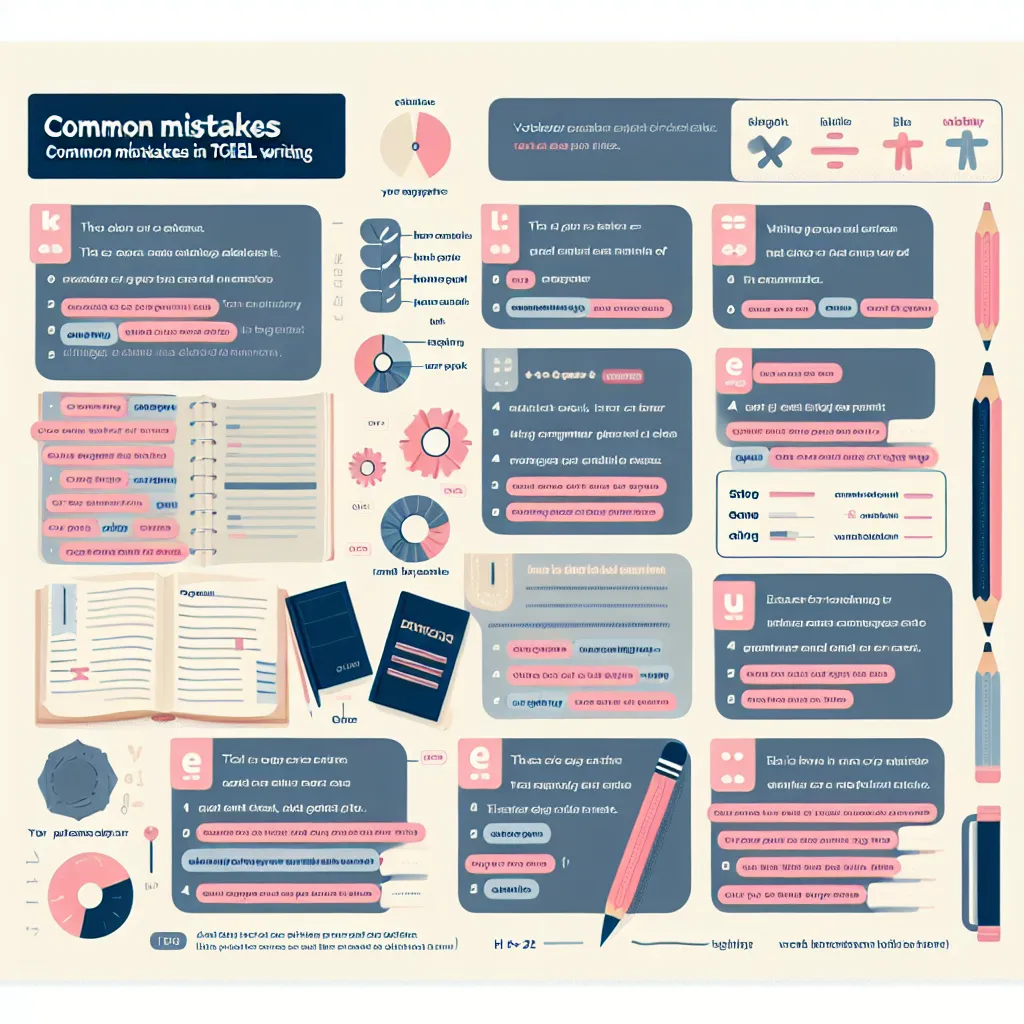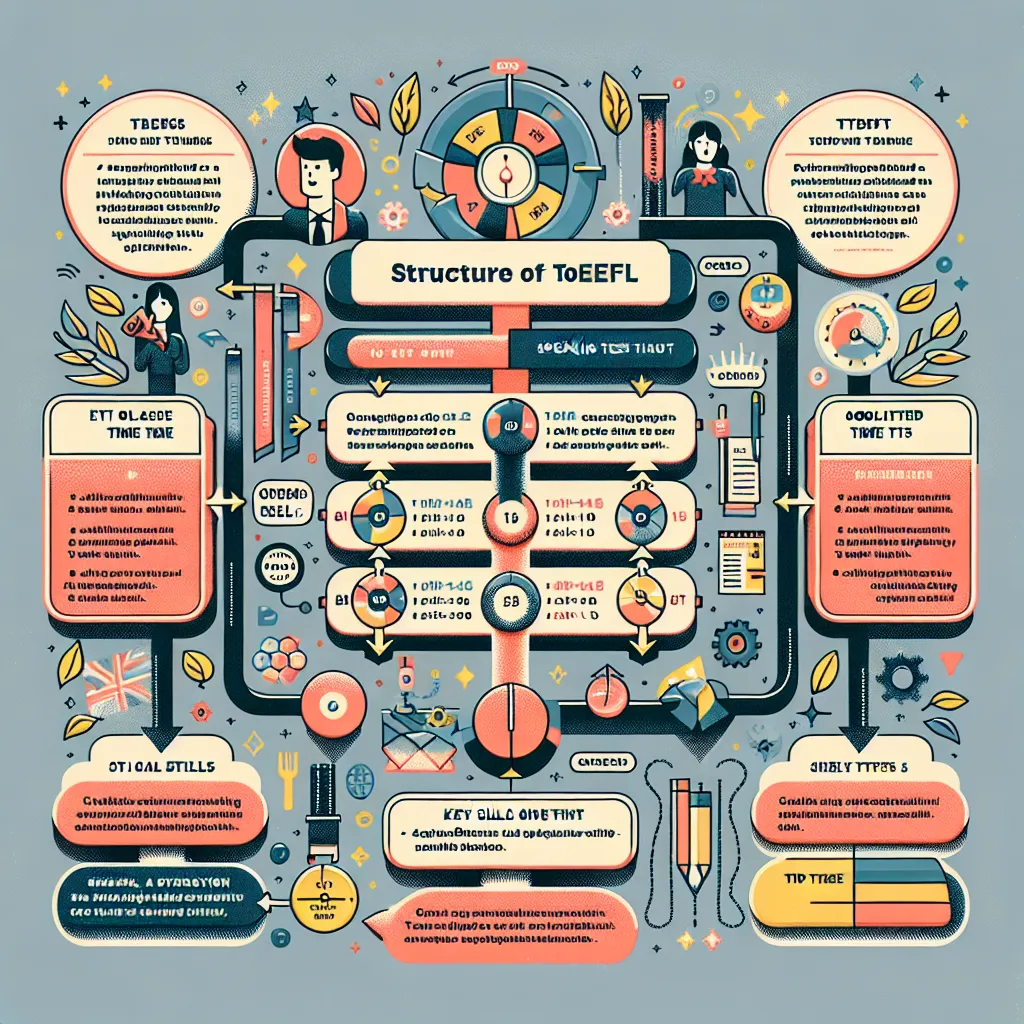The TOEFL Writing section is a crucial component of the TOEFL iBT test, challenging test-takers to demonstrate their ability to write clear, coherent, and well-structured essays in English. However, many students make common mistakes that can significantly impact their scores. In this comprehensive guide, we’ll explore the most frequent errors in TOEFL Writing and provide valuable tips to help you avoid them.
Understanding the TOEFL Writing Section
Before diving into the common mistakes, it’s essential to understand the structure of the TOEFL Writing section. This part of the test consists of two tasks:
- Integrated Writing Task (20 minutes)
- Independent Writing Task (30 minutes)
Each task assesses different aspects of your writing skills, and being aware of their requirements is crucial for success.
 TOEFL Writing Section Overview
TOEFL Writing Section Overview
Common Mistakes in TOEFL Writing
1. Poor Time Management
One of the most critical errors students make is not managing their time effectively. The TOEFL Writing section has strict time limits, and failing to allocate your time wisely can result in incomplete essays or rushed conclusions.
Tips to avoid this mistake:
- Practice writing timed essays regularly
- Use a watch or timer during practice sessions
- Allocate specific time for planning, writing, and reviewing your essay
2. Lack of Essay Structure
A well-structured essay is crucial for achieving a high score in TOEFL Writing. Many students struggle with organizing their thoughts coherently, leading to disjointed and unclear essays.
How to improve your essay structure:
- Use a clear introduction, body paragraphs, and conclusion
- Include a strong thesis statement in your introduction
- Ensure each paragraph focuses on a single main idea
- Use transition words to connect your ideas smoothly
3. Insufficient Development of Ideas
Another common mistake is not providing enough details or examples to support your arguments. TOEFL graders are looking for well-developed ideas with specific supporting evidence.
To address this issue:
- Brainstorm relevant examples before writing
- Use personal experiences, statistics, or expert opinions to support your points
- Explain how your examples relate to your main argument
4. Grammar and Vocabulary Errors
While perfect grammar is not expected, frequent errors can significantly impact your score. Similarly, using limited vocabulary or inappropriate word choices can hinder your ability to express ideas clearly.
Strategies to improve:
- Review common grammar rules regularly
- Practice using a variety of sentence structures
- Build your vocabulary with TOEFL-specific word lists
- Use online resources or language learning apps to enhance your skills
 Common TOEFL Writing Errors
Common TOEFL Writing Errors
5. Misunderstanding the Task
Some test-takers fail to address the prompt correctly, especially in the Independent Writing Task. This can result in off-topic essays that receive low scores.
How to avoid this mistake:
- Read the prompt carefully multiple times
- Underline key words in the prompt
- Make sure your thesis statement directly answers the question
- Refer back to the prompt while writing to stay on track
6. Plagiarism and Memorized Responses
Using memorized essays or copying content from the reading or listening passages is a serious offense in the TOEFL test. It can result in a score of zero or even disqualification.
To steer clear of this issue:
- Use your own words and ideas
- Paraphrase information from the passages in the Integrated Task
- Practice developing original responses to various prompts
7. Neglecting the Revision Process
Many students spend all their time writing and forget to review their work. This can lead to avoidable errors and missed opportunities for improvement.
Tips for effective revision:
- Save 2-3 minutes at the end of each task for proofreading
- Check for spelling and punctuation errors
- Ensure your essay flows logically
- Look for opportunities to improve word choice or sentence structure
Strategies for Success in TOEFL Writing
To avoid these common mistakes and improve your TOEFL Writing score, consider the following strategies:
- Practice regularly with real TOEFL prompts
- Familiarize yourself with the scoring rubric
- Seek feedback from experienced TOEFL tutors or native English speakers
- Read high-quality English articles to improve your vocabulary and writing style
- Use TOEFL Writing templates as a guide, but personalize them for each prompt
- Take full-length practice tests to improve your time management skills
Remember, improving your writing skills takes time and consistent effort. Be patient with yourself and focus on steady progress rather than perfection.
Conclusion
Understanding and avoiding the most common mistakes in TOEFL Writing is crucial for achieving a high score on the test. By addressing issues such as time management, essay structure, idea development, and language accuracy, you can significantly enhance your performance. Keep practicing, stay focused on the task requirements, and always strive to express your ideas clearly and coherently. With dedication and the right approach, you can overcome these challenges and excel in the TOEFL Writing section.
We encourage you to share your experiences or ask questions about TOEFL Writing in the comments section below. For more TOEFL preparation tips and resources, explore our other articles on test-taking strategies and skill-building exercises.




